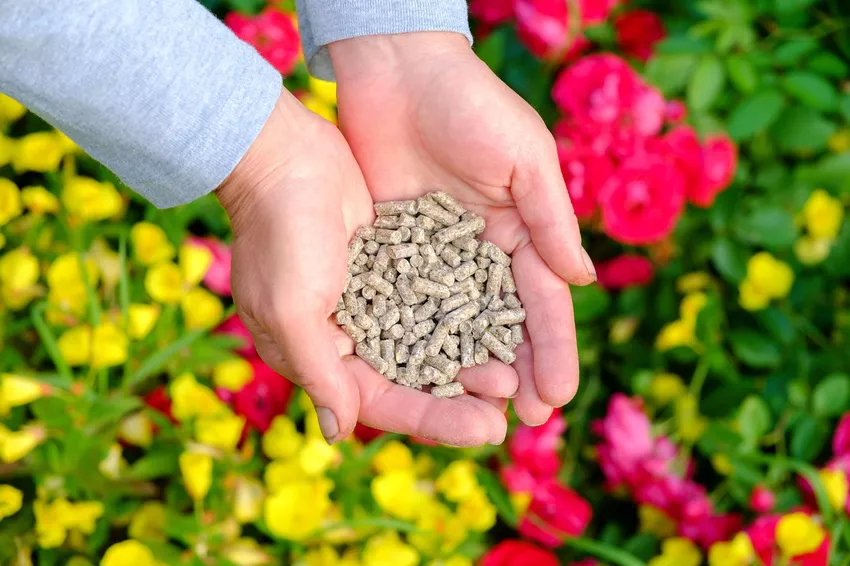In order for roses to fully develop their breathtaking flowers, they need the right fertilizer. We show what rose fertilizer is and why it is so important.

In beautiful gardens one often comes across roses that fall short of their potential. Despite the complex pruning, winter protection and frequent treatment against pests, the beauty does not show itself from its best side. The cause is often improper fertilization. But fear not, this problem can be quickly eradicated by choosing a specially formulated rose fertilizer.
The rose (Rosa) is probably the most popular flowering shrub in our gardens - even though it is difficult to care for. This article enlightens you on the need for a specific rose fertilizer and compares organic, mineral and certified organic rose fertilizer.
Why do roses need a special fertilizer?
The queen of flowering shrubs can use a specially formulated fertilizer for the following reasons:
- The formation of flowers costs deciduous trees and shrubs a lot of energy - this is especially true for the types that flower after flowering and that flower more often. Little attention is often paid to the development of the ornamental rose hips, but here, too, large amounts of assimilate and nutrient elements are bound.
- A properly composed fertilizer helps to promote shoot closure and frost hardiness and, in addition to "green growth", also to stimulate flowering.
- The right fertilizer promotes high soil quality, which is of great importance for nutrient-hungry, deep-rooted roses.
- An optimal supply enables the roses to store sufficient reserve substances at the end of the vegetation period, so that nothing stands in the way of vigorous budding next year.
What is rose fertilizer made of?
Different types of rose fertilizer contain different ingredients to nourish your roses. A distinction is made between mineral, organic, organo-mineral and certified organic rose fertilizers:
| Fertilizer Type | Ingredients |
|---|---|
| Mineral rose fertilizer | Selection of nutrients in pure s alt form |
| Organic Rose Fertilizer | Major and trace nutrients in a package of high-carbon, grown structures |
| Organic mineral rose fertilizer | Mineral and organic components in roughly equal proportions |
| Organic Rose Fertilizer | Mostly organic components, additional organic certified mineral components |
Rose fertilizer tested
Rose fertilizers may not differ in their nutrient weights, but the type of fertilizer has a significant impact on the effect, the soil fertilized and thus the rose that grows in it.

Mineral rose fertilizer
As already mentioned above, mineral fertilizers for roses contain some of the plant nutrients that roses need: in addition to the main nutrients nitrogen (N), phosphorus (P) and potassium (K), there are sometimes other nutrients that the rose contains in smaller amounts be included. Unfortunately, the fact that these are the only effective components of the mineral fertilizer brings with it a number of problems:
- Since all the necessary nutrients are never contained, the rose must absorb a variety of essential nutrients from the soil supplies. The soil and pot filling can become depleted of these nutrients in the long term, resulting in deficiency symptoms that are often difficult for the layperson to recognize.
- Specifically, the mineral nitrogen stimulates the soil organisms to break down organic matter in the soil - including humus.
- Because no new organic structural material is brought in, it is not possible to build up new humus.
- Declining humus levels lead to poorer soil properties: water retention and aeration as well as nutrient availability and root penetration decrease.
- Incorrect application can accidentally lead to over-fertilization due to the rapid solubility: In the best case, the result is reduced flowering or increased susceptibility to frost, in the worst case, the rose can die.
Because of the disadvantages of mineral rose fertilizers, we therefore recommend the use of preparations that primarily rely on organic components and are ideally also of organic quality.
Organic Rose Fertilizer
Organic rose fertilizers bring in a variety of nutrients and various trace elementsthe floor. It also contains organic, carbon-containing compounds that soil organisms can decompose and humify. The nutrients contained are only released after decomposition, so that organic fertilizers always have a slower rate of action.

However, the introduction of high and low molecular weight structures enables soil organisms to be fed, from which every plant benefits directly and indirectly: They create a kind of nutrient buffer and thus enable an even supply, transforming structures that are difficult to decompose into new, fertile ones humus and sometimes even live in complex symbiotic relationships with the roots of our garden plants - and thus also our roses. Despite its slow rate of action, organic fertilizer can optimize the site for roses over the long term, allowing for good hardiness, growth and flowering.
Organic Rose Fertilizer
Rose fertilizer with an organic certificate contains organic and mineral components, whereby all mineral components must also be permitted in organic farming. They should only have a supplementary effect, the lion's share of the ingredients is of natural origin. Our Plantura organic rose fertilizer is also a fertilizer that is permitted in organic farming, but it has one small special feature: all the organic raw materials used are of purely vegetable origin, which means that our Plantura organic rose fertilizer contains no slaughterhouse waste and none Animal droppings.
Tip: The phosphate content in organic fertilizers is often relatively low and that makes sense. Because phosphate is sufficiently present in almost all garden soils, it should not be added to the soil in large quantities. This also protects the finite fossil phosphate reserves. If you are now wondering how to fertilize your roses correctly and when is the ideal time to do so, you will find all the important information summarized here.